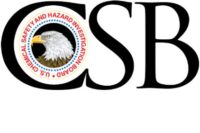College chemical engineering curriculum toughened up thanks to CSB, AIHcE

 Chemical Safety Board (CSB) Chairperson Rafael Moure-Eraso is commending the American Intitute of Chemical Engineers (AIHcE) for working for the inclusion of reactive hazard awareness in college chemical engineering curriculum. The Accreditation Board for Engineering and Technology (ABET) has approved AIChE-proposed changes that require proficiency in reactive chemical hazards as well as all chemical process hazards among a broad range of engineering disciplines.
Chemical Safety Board (CSB) Chairperson Rafael Moure-Eraso is commending the American Intitute of Chemical Engineers (AIHcE) for working for the inclusion of reactive hazard awareness in college chemical engineering curriculum. The Accreditation Board for Engineering and Technology (ABET) has approved AIChE-proposed changes that require proficiency in reactive chemical hazards as well as all chemical process hazards among a broad range of engineering disciplines.
The CSB had called on AIChE -- a 50,000 member+ professional association -- to work with ABET as a result of the Board's 2009 investigation report into the fatal reactive chemical accident at T2 Laboratories in Jacksonville, Florida.
The CSB final report into the accident at T2 Laboratories concluded that T2 employees did not recognize all of the potential hazards when designing their process for making a gasoline additive. The employees had little to no reactive chemistry experience, though one of them had a bachelor’s degree in chemical engineering. The report therefore called for improving the education of chemical engineering students on reactive chemical hazards. The explosion and fire on December 19, 2007, killed four T2 employees and injured four others. In addition, 28 people working at nearby businesses were injured when building walls and windows blew in. Some of those businesses never recovered and shutdown permanently and the blast sent debris up to a mile away damaging buildings within a quarter-mile of the facility.
Moure-Eraso called the AIChE's response to the CSB's recommendations "outstanding."
"If future chemical engineers are given the proper educational tools, they will be able to more fully comprehend and better manage the hazards in a chemical manufacturing process," Moure-Eraso said.
Looking for a reprint of this article?
From high-res PDFs to custom plaques, order your copy today!




